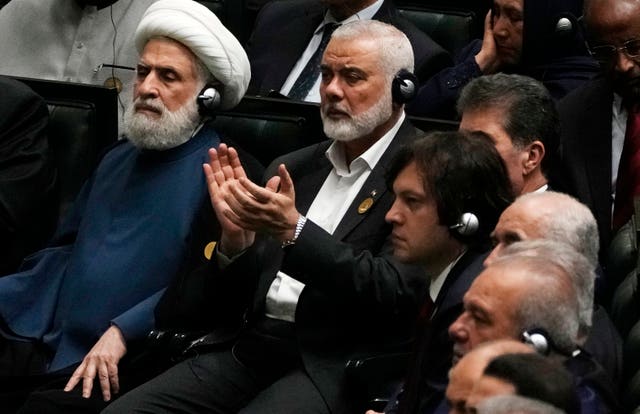Hamas military wing chief Mohammed Deif died in Gaza strike, Israel says
Israel targeted Mohammed Deif in a strike on July 13 that hit a compound on the outskirts of the southern Gaza city of Khan Younis.

The Israeli military said on Thursday that it has confirmed that the head of Hamas’s military wing, Mohammed Deif, was killed in an airstrike in Gaza in July.
The announcement comes a day after an apparent Israeli strike in the Iranian capital killed Hamas’s top political leader.
Israel believes that Mr Deif, the head of Hamas’s military, and Yahya Sinwar, the top Hamas leader in Gaza, were the chief architects of the October 7 attack that killed some 1,200 people in southern Israel and triggered the Israel-Hamas war.
Mr Sinwar is believed to remain in hiding in Gaza.
Israel has not confirmed or denied it was behind Tuesday’s strike in Tehran that killed Ismail Haniyeh, Hamas’s political chief.
Hamas has said Mr Deif survived the July attack in Gaza and did not immediately comment on the military’s announcement of confirmation.
A member of Hamas’s political bureau, Izzat al-Risheq, said in a statement on Thursday that confirming or denying his death is the responsibility of the armed wing, known as the Izzedin al-Qassam Brigades, which so far was silent.
The killing of two of Hamas’s most senior figures brings a victory for Israeli Prime Minister Netanyahu, who has said that he will not end the campaign in Gaza until Israel destroys Hamas’s military capabilities.
Israeli Defence Minister Yoav Gallant said the strike that killed Mr Deif was a “significant milestone” toward achieving the goals of the war.
“The results of this operation reflect that Hamas is an organisation in disintegration,” he wrote on X, formerly Twitter.
Israeli finance minister Bezalel Smotrich said the “defeat of Hamas is closer than ever”. He said the military would continue to “eliminate thousands of other terrorists until our security is restored and we bring the hostages home”.
The assassinations risk pushing Hamas to harden its position in negotiations for a ceasefire – or to drop out completely. And Iran has vowed vengeance for the strike on its soil, raising fears of an all-out regional war.
Israel targeted Mr Deif in a July 13 strike that hit a compound on the outskirts of the southern Gaza city of Khan Younis.
The military said at the time that another Hamas commander, Rafa Salama, was killed.
More than 90 other people, including displaced civilians in nearby tents, were killed in the strike, Gaza health officials said at the time.
In a statement on Thursday, the Israeli military said that “following an intelligence assessment, it can be confirmed that Mohammed Deif was eliminated in the strike”.

More than 80% of the population of 2.3 million have been driven from their homes, the vast majority crammed into tent camps in the south-west corner of the territory, with limited food and water.
Mr Deif was one of the founders of Hamas’ military wing, the Qassam Brigades, in the 1990s and led the unit for decades.
Under his command, it carried out dozens of suicide bombings against Israelis on buses and at cafes and built up a formidable arsenal of rockets that could strike deep into Israel.
He remained a mysterious, underground figure in Gaza. He never appeared in public, was hardly ever photographed and only rarely was his voice heard in audio statements.
He survived a string of Israeli assassination attempts.
Qatari and Egyptian officials had tense exchanges with US counterparts over the alleged assassination, said an Egyptian official with direct knowledge of the talks, speaking on condition of anonymity.
While the US has been pressing Egyptian and Qatari mediators to get Hamas to compromise, the Americans cannot “pressure the other party, Israel to … refrain from provocative acts”, the Egyptian official said, calling the alleged assassination “reckless”.
Qatar’s prime minister, Mohammed bin Abdulrahman bin Jassim Al Thani, expressed frustration in a post on social media, saying: “Can mediation succeed when one party assassinates the negotiator on the other side?”
US Secretary of State Antony Blinken said on Wednesday that the US had no prior knowledge of the strike in Tehran that killed Mr Haniyeh.
The Egyptian official said no deal was likely in the near future since Hamas must now name Mr Haniyeh’s replacement. Mediators had been waiting for Hamas’s response on the latest version of the deal. Instead, after Mr Haniyeh’s funeral, expected Friday, he said they will approach Hamas officials to explore the next steps.





